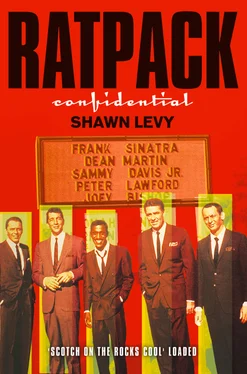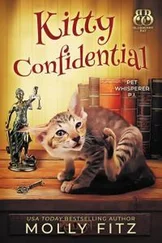And so it went. He forced himself higher and higher in the ranks of showbiz, garnering accolades, cutting records, standing out a bit more from Big Sam and Mastin with each performance, getting paid a little better with each gig. At the same time, he was hustled by cops to the backs of movie theaters, snubbed at the doors of the Copacabana and Lindy’s, barred even from men’s rooms in some of the theaters he packed with paying customers. If he grew to hate himself in some twisted fashion, he could hardly be blamed.
But repeatedly he found in his corner that skinny guy he’d met in Detroit. When Sammy was in the army, Frank had become a monster star, and when he was discharged and caught up with Mastin and Big Sam in Los Angeles, he made his way over to NBC studios in Hollywood, resplendent in his dress uniform, to watch Sinatra perform his weekly stint on Your Hit Parade. After the show, he waited out back with the bobby-soxers and autograph hounds and sheepishly offered Sinatra a piece of paper to sign.
“Didn’t you work with your old man and another guy?” Frank asked, and he invited him to the next few shows, letting Sammy drink in rehearsals and backstage ambiance until another gig dragged the Mastin Trio back onto the road.
Two years later, Frank insisted that Sidney Piermont, manager of New York’s Capitol Theater, book the Mastins as his opening act at $1,250 a week—a sum that staggered Mastin and Big Sam. Sinatra never told Sammy that he was behind the act’s being hired—Piermont had wanted the Nicholas Brothers and then gagged at the price Sinatra wanted to pay Mastin—but in every other respect he treated Sammy like a peer throughout the engagement. They parted bosom pals: “Remember,” Frank told Sammy as he left for his next booking—and this was his most profound gesture of friendship—“if anybody hits you, let me know.”
But in the early fifties, no one, it seemed, wanted to hit Sammy. He was the quickest-rising star in nightclubs and theaters, particularly among the New York and L.A. cognoscenti. In 1951, the Will Mastin Trio opened at Ciro’s, the hot Sunset Strip nightclub. The room was packed with Hollywood royalty, and Sammy and Company couldn’t do enough. Dancing, singing, little comic bits, everything was a hit, nothing more so than Sammy’s impersonations of such white stars as Jimmy Cagney, Cary Grant, and Humphrey Bogart. The same good fortune followed at an engagement at the Copacabana, the dream club of Sammy’s youth, some months later. He was on the map to stay.
There was nevertheless a feeling of vertigo to it all. Although all the right people came to his shows, although he was welcome in the homes of Hollywood’s crown royalty, he sensed a distance between himself and the fellow to whom all this good fortune fell, an inner gap separating the real man from the personality he’d become. He became famous for his tight pants, his extravagant spending, his largesse, his energy. But he’d also become infamous, in the tabloid press, as a consort—often only rumored—of white actresses, and the black press could be cutting in their comments about his seeming disregard for his race.
He was calculating and savvy enough to know that all publicity was good publicity—he was thrilled that his name made for hot ink—but he was wounded by the unfairness at the root of it. His race excluded him from a number of opportunities, so he created his own success; his success lifted him out of his race and made him a star simply because of his sheer talent; yet his talent could never entirely erase his race and, in fact, made him more visible as a black man and thus more open to injustice and prejudice. He walked a perilous line between one self, the black man who could be snubbed at the doors of exclusive New York nightclubs, and another self, the showbiz whirligig whom everybody wanted a piece of. He couldn’t avoid being “Sammy Davis Jr.,” even when “Sammy Davis Jr.” was the butt of jokes, gossip, and irrational hate.
Success, money, career offers, work—all this kept the doubts at bay for some of the time, but he was still profoundly susceptible to anxiety about his hold on his life. He would read reviews and compare them to previous notices from the same critics; he would call up clubs he was playing and ask, his voice disguised, if it was still possible to get a table for that evening’s performance, collapsing in secret gratitude at the news that his shows were sold out. He was such a lost, addled soul that he began seeking answers in, of all places, Judaism, the religion of so many of the showbiz uncles who’d taken him so readily under their wings. He knew he could never escape who he was, but he kept searching for ways to somehow, maybe, evolve out of it.
Little by little, barriers fell as to the sheer force of his talent. In 1954, the Mastin Trio was invited not only to play the Frontier but to stay there, to eat, gamble, and socialize among the white customers and make a whopping $7,500 a week besides. Sammy would have to commute back and forth to L.A., where he was doing some record work, but it was a dream gig and they leapt at it. You simply couldn’t do any better than that.
Which was why it was so tragic, the car crash. Driving his Cadillac convertible to Los Angeles late on the night of November 19, 1954, listening to his own hit record “Hey There” on the radio, Sammy crossed into oncoming traffic in order to avoid a car that was making a U-turn right there in front of him on the highway. In the ensuing collision, his head hit the steering wheel. A stylized cone of chrome sticking out of the center of it like a battering ram put out his left eye.
His thoughts upon seeing his own mangled face in a piece of broken mirror as rescuers came to fetch him? “They’re going to hate me again.”
He was rushed to a hospital near Palm Springs, and Hollywood rushed to his side. Tony Curtis and Janet Leigh waited on him as he was in surgery; Frank visited constantly, as did a steady parade of showbiz lights; Jeff Chandler took the stage in his stead in Las Vegas—and nobody complained.
And when he came back, at Ciro’s, dancing and singing and gagging with maybe even more energy than before, not to mention a rakish eye patch, the world clapped its hands raw and cried with affection for him. The accident turned out to be the thing that put him over the top; he could do it all, even beat death. It was like Frank dying on-screen in From Here to Eternity: It made him forever more.
An entire Broadway show, Mr. Wonderful , was built around him. There was a rags-to-riches story to it, and Chita Rivera and Jack Carter had parts, but the point of it was Sammy’s nightclub-style performance in the second act, a partially scripted, partially free-form extravaganza of the sort that Al Jolson used to deliver when he was still in the legitimate theater. Mastin and Big Sam were on the stage with him, but it was Sammy’s name on the marquee. He did benefits, TV spots, radio appearances; he partied every night in restaurants and clubs and later in his hotel suite; he became a notorious tomcat on the prowl.
Soon enough, he was so big that the movies came calling. He played Sportin’ Life in Otto Preminger’s Porgy and Bess , and, in a great legends-of-Hollywood yarn, stunned producer Samuel Goldwyn into silence by declaring that he refused to work on Yom Kippur. “Directors I can fight,” Goldwyn lamented. “Fires on the set I can fight. Writers, even actors I can fight. But a Jewish colored fellow? This I can’t fight!”
A Jewish colored fellow: a whirling dervish: an up-and-coming superstar: just as he’d always dreamed.
Poor Peter.
Try this for a curse: You have looks, breeding, savoir faire, but no real talent other than the ability to deploy your mien to ingratiate yourself to the world; nevertheless, fate rewards you with sex, money, fame, station; you spend a decade or two floating atop a gigantic bubble; you can do no wrong; then it all goes slowly sour; a few missteps, two or three vicious body blows, innumerable little jabs and lacerations, and one day you wake up in your own shit, bankrupt, dazed, strung-out, a laughing-stock, alone—Whatever Happened To You?
Читать дальше












